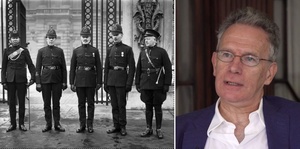

From top: members of The Royal Irish Constabulary (RIC); Fintan O’Toole; Eamonn Kelly
Fintan O’Toole’s subscriber-only article in The Irish Times on Saturday (January 11) followed on from Fine Gael’s narrative that the protests against the RIC commemoration were directed squarely at the RIC, betraying immaturity on behalf of those who protested and implying a simple and antiquated anti-British bias.
He drew on Sebastian Barry’s play “The Steward of Christendom” as an example of a hope that, culturally, we had matured enough to forgive; seeming to take the general view, expressed by others in what Eamon Dunphy used to call “official Ireland”, that the protests were a result of ignorance and immaturity, and he concentrated his focus entirely on RIC casualties in the 1920s, underlining their Irishness.
There was no mention of Minister Flanagan fibbing about the role of the Expert Advisory Group in the decision to stage the commemoration – just another in a long line of Fine Gael people fibbing – or about the wider strategic political moves related to the Stormont reassembly as the Taoiseach apparently went for some kind of promised united Ireland home run in time for the pending election.
There was no mention of the lack of consultation with the public by government on the proposed RIC commemoration, and no acknowledgment that the reaction had as much to do with present-day anger at Fine Gael finding an outlet, similar to that which occurred with the water charges controversy, for the disasters in housing and health. And there was no mention of the Black and Tans as a factor.
The Good Priest Argument
Instead, the argument Fintan O’ Toole presented was similar in many ways to the “good priest” argument that defenders of the church brought forth in response to the abuse revelations of the 1990s. Similarly, now we have the “good RIC man” argument.
No one would deny that there were good RIC men, and yet this is precisely the argument that O’Toole chose to contest, as if this were the entire substance of the reaction to the RIC commemoration.
This from a writer whose subtlety revealed the forces driving Brexit but who now somehow can’t see that maybe the protests against the RIC commemoration were far more nuanced than simply the expression of an old nationalistic prejudice.
That what may really have happened was that maybe ordinary Irish people said No to the establishment. And with their voices now amplified by social media, the establishment heard that voice and not only did they not like it; they clearly didn’t understand it.
And worse, appeared to believe that Irish people do not have the right to hold power to account, the very principle under-pinning any healthily functioning republic.
Ireland’s establishment seems not used to being questioned. Rather, it pronounces and expects obedience, a habit inculcated by colonialism and by the church.
At its heart this seems based on a fundamental disrespect for ordinary people. Fine Gael don’t bother consulting people about anything.
They bully stuff through. They do as they please and denigrate the public when the public speaks out. This attitude was best exemplified in recent times by the photo of Dara Murphy and his spouse grinning out of their car in a can’t-touch-me kind of way after the double-jobbing scandal.
Even after the RIC debacle the Taoiseach said, almost like a parent-scolding children, that the Irish public, by speaking out, may have jeopardised the hoped-for united Ireland.
How? By speaking out against a careless, condescending government as free citizens of a republic?
The Managerial Class
You often hear it said that problems in the health service, or housing, or insurance, or any other area you care to name that isn’t functioning to its fullest potential, are “systemic”.
On closer scrutiny it often seems that the systemic problems identified are due to management being favoured over the actual practitioners. Health funding seems to go mainly to managers; arts funding to administrators, and so on.
What if each area hampered by so-called systemic problems, was only a fractal of an overriding systemic problem? Namely a problem where managers and administrators are rewarded at the expense of practitioners, at a national level.
In other words, a system where a cultural elite does the managing and commands all the levers of power and derives the most from the system it essentially owns, allowing also the control of the narrative of events.
Just as Fintan O’Toole was controlling the narrative of the RIC controversy, characterising opponents of the RIC commemoration as being mistaken in their understanding of the proposed event. Or as being intellectually unable to manage the subtleties at play; or as simply anti-British. Or worse, as little more than abusive social media trolls.
Fintan O’Toole’s article reinforces prejudicial ideas that serve the managerial class, leaving the reader with the inevitable conclusion of, Oh I see, the whole RIC debacle is the people’s fault, is it – for being too thick?
A Maturing Republic
But the reaction to Fine Gael’s RIC proposal might equally be framed as the emergence of a people mature enough to speak back to power and hold it to account.
The ideal at the heart of any republic is that all are equal, entitled to equal say, and that all ideally participate in building the republic by being unafraid to speak truth to power,
The public reaction to Fine Gael’s mishandling of the RIC commemoration idea would suggest the emergence, not of an ignorant rabble, as characterised by the elite and its spokespersons, but rather the emergence of a young republic finally beginning to come to maturity.
Eamonn Kelly is a freelance Writer and Playwright.
Previously: Eamonn Kelly on Broadsheet












